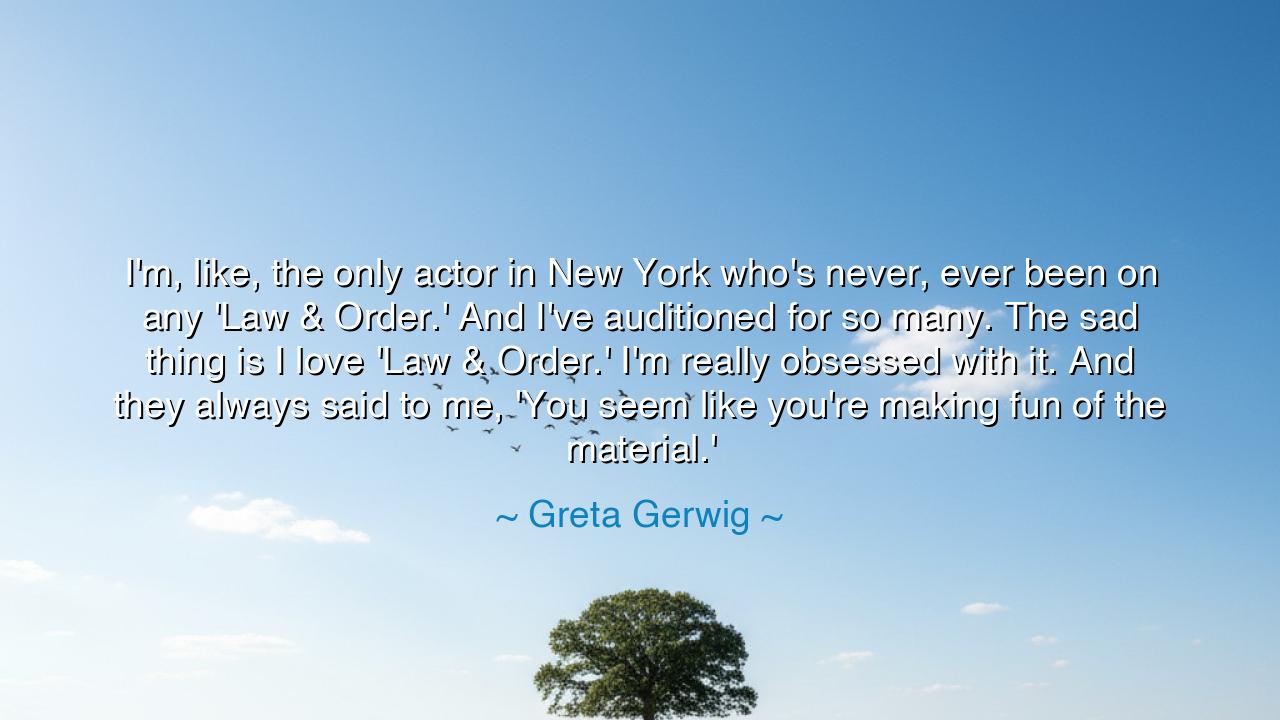
I'm, like, the only actor in New York who's never, ever been on
I'm, like, the only actor in New York who's never, ever been on any 'Law & Order.' And I've auditioned for so many. The sad thing is I love 'Law & Order.' I'm really obsessed with it. And they always said to me, 'You seem like you're making fun of the material.'






Hear now, O seekers of craft and persistence, the voice of Greta Gerwig, who with honesty and humor declared: “I’m, like, the only actor in New York who’s never, ever been on any ‘Law & Order.’ And I’ve auditioned for so many. The sad thing is I love ‘Law & Order.’ I’m really obsessed with it. And they always said to me, ‘You seem like you’re making fun of the material.’” These words, though playful, carry within them a profound reflection on the path of the artist: the sting of rejection, the irony of loving that which excludes you, and the difficulty of being misunderstood for what you are.
First, let us meditate on her claim: the only actor in New York never to appear on Law & Order. This television series, a towering institution of American drama, was for decades the training ground, proving stage, and bread-giver for countless performers. To appear on it was a rite of passage, a badge of belonging. Gerwig, though herself immensely talented, was denied entry into this ritual, and so she felt the sting of being set apart, the one who did not share in the common bond of her peers.
Next, consider the sadness of her confession: she not only longed for the role but loved the very show that refused her. To be obsessed with a thing and yet perpetually excluded from it is one of life’s crueler ironies. It is the experience of the lover who cannot be loved back, the student who cannot enter the gates of the academy he reveres. In Gerwig’s sorrow, we glimpse the pain of every artist whose passion collides with rejection, whose devotion is not enough to open the door.
Her rejection was not for lack of effort—she auditioned for so many. Yet always came the same judgment: “You seem like you’re making fun of the material.” Here lies the heart of her struggle. Her natural style—wry, self-aware, touched with irony—was misunderstood. What she offered was not mockery but uniqueness; yet the guardians of the gate could not see it. And so what made her special became the very thing that kept her outside. This, too, is the fate of many innovators: their gift is first mistaken for fault.
History is filled with such examples. Consider Vincent van Gogh, whose paintings, vibrant with new light, were dismissed by the art world of his time as crude or mocking the traditions of beauty. He died unrecognized, yet his misunderstood vision would later define modern painting. Gerwig’s story echoes his in miniature: to be rejected not because you lack worth, but because your worth takes a form the world does not yet understand.
Thus the meaning of her words is this: rejection is not always a verdict of failure. Often it is merely a sign that your spirit does not fit the mold others have carved. Law & Order could not see Gerwig’s power, but cinema would later reveal it. Her path was not to blend into the chorus of New York actors passing through a procedural drama, but to rise beyond it, shaping stories of her own as writer and director, where her voice could not be mistaken for parody but honored as truth.
So, dear listener, take this lesson: do not despair when doors close, even those you long for most. What rejects you may simply not be worthy of your uniqueness. When told that your style, your voice, or your way of being “does not fit,” remember that it may be precisely what will one day set you apart as great. Take practical steps: persist in your work, refine your voice, and seek the places where your authenticity is not only tolerated but celebrated. For as Gerwig’s journey shows us, rejection is often the womb of destiny, and being misunderstood may be the first step toward being immortalized.






AAdministratorAdministrator
Welcome, honored guests. Please leave a comment, we will respond soon